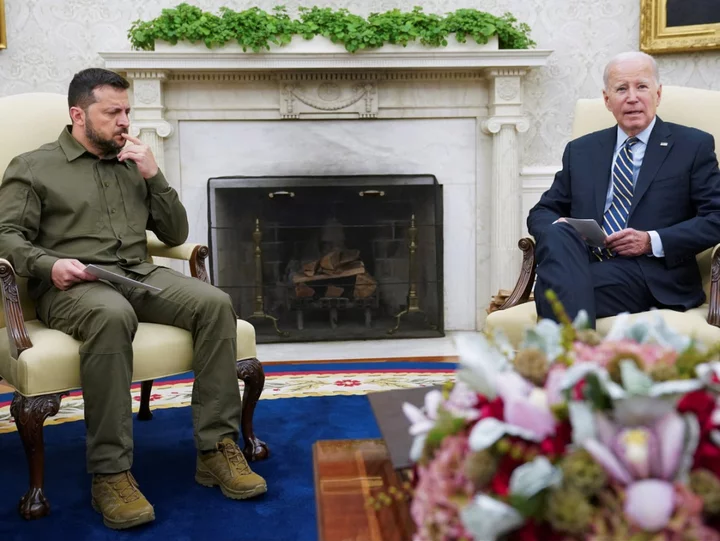
Ukraine-Russia war - live: Biden’s $325m package for Zelensky as Pentagon says Abram tanks ‘on schedule’
Joe Biden has announced a new $325m military aid package for Ukraine that will include air defence systems and other weaponry to help Kyiv face a tough winter, White House national security adviser Jake Sullivan said. The announcement came as he met Volodymyr Zelensky at the White House after the Ukrainian leader had what he said were “frank” conversations with members of Congress over future support. This comes as the Pentagon announced “everything is on schedule” after being asked about the timing of the top-tier Abram tanks in the war zone for Ukraine. “For security reasons, I’m not going to be able to go into specifics in terms of when the tanks will arrive, other than to say that we expect them to arrive in Ukraine in the coming days and weeks,” Pentagon spokesperson brigadier general Patrick Ryder said in his briefing with reporters. Earlier, experts said Russian military chiefs had ordered troops to carry out “ill-conceived and unsupported” counterattacks in Bakhmut to urgently regain lost ground. One military blogger reportedly observed that “hysterical” counterattacks were depleting Russian resources and reserves. Read More Biden pledges more support for Ukraine’s defence as he announces new arms package President Zelensky and Ukraine’s First Lady arrive at White House Zelensky says he had ‘very strong dialogue with senators’ after closed-door meeting over Ukraine aid
2023-09-22 12:16
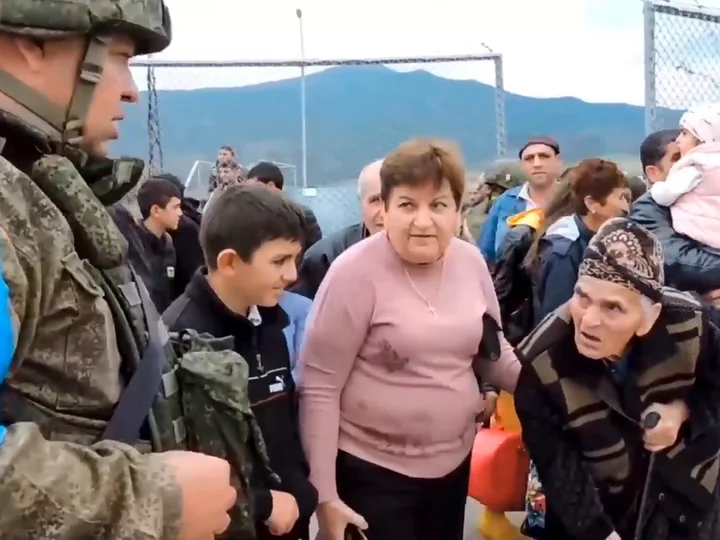
‘Food is running out’: Warning of humanitarian crisis in Nagorno-Karabakh as no deal reached in talks
Talks between a breakaway Armenian republic and Azerbaijan over the future of the wartorn region of Nagorno-Karabakh closed on Thursday without a final agreement, amid accusations Baku’s forces violated a ceasefire. A tense truce has been in place since Azerbaijan’s army claimed full control over the area after launching a lightning offensive against local Armenian forces on Tuesday. Residents of the Karabakh’s main city told The Independent that shelling and gunfire rang through the suburbs on Thursday morning. They added that a “humanitarian catastrophe” was unfolding as electricity had been completely cut off, food was running out and thousands of displaced civilians were hiding in shelters. Azerbaijani officials on Thursday agreed to provide humanitarian aid, including energy to heat kindergartens and schools, a statement from Azerbaijan president Ilham Aliyev’s office said. Meanwhile Mr Aliyev declared victory in a televised address to the nation, saying his country had restored its sovereignty over Nagorno-Karabakh. The Independent was unable to verify who was behind the attacks, which came amid talks to hammer out an agreement ahead of a United Nations Security Council meeting on the violence. Karabakh’s Armenian authorities blamed the assault on Azerbaijani forces. Baku’s defence ministry called the allegations it had broken the truce “completely false”. Thursday’s meeting held in the Azerbaijani town of Yevlakh ended in no firm deal. David Babayan, an adviser to Nagorno-Karabah’s ethnic Armenian leader Samvel Shahramanyan, told Reuters that while there was an agreement over the cessation of military action “we await a final agreement, talks are going on”. He said that there were not enough security guarantees in place to mean that local Armenian forces would give up their weapons. “A whole host of questions still need to be resolved,” he said. Both sides have been locked in a bloody battle over the mountainous Nagorno-Karabakh region, also known as Artsakh by Armenians, since the 1990s following the collapse of the Soviet Union. It is internationally recognised as part of Azerbaijan – which is backed by Turkey – but home to 120,000 ethnic Armenians who have enjoyed de facto independence. In 2020, a six-week war erupted which left 6,700 people dead and saw Azerbaijan reclaim about a third of the region. Russia, historically a close ally of Armenia that has long seen itself as a security guarantee in the South Caucuses, brokered a truce and dispatched 2,000 peacekeepers. That was broken on Tuesday by the Azerbaijan army that unleashed a fresh wave of artillery and drone strikes against the outnumbered and undersupplied pro-Armenian forces, raising concerns that a full-scale war could resume. The fighting worsened an already burgeoning humanitarian crisis for residents who have endured nine months of food, electricity and medicine shortages. This is due to Azerbaijan’s blockade of the “Lachin Corridor”, the road connecting Nagorno-Karabakh to Armenia. Nagorno-Karabakh human rights ombudsman Gegham Stepanyan said at least 200 people, including 10 civilians, were killed. The figures could not immediately be independently verified. Facing mounting pressure, local Armenian self-defence forces agreed on Wednesday to disarm and disband. The UN Security Council scheduled an urgent meeting on Thursday on the Azerbaijani offensive at the request of France. French president Emmanuel Macron condemned Azerbaijan’s decision to use force “at the risk of worsening the humanitarian crisis in Nagorno-Karabakh”. US secretary of state Antony Blinken denounced Baku’s use of military force saying that these actions “undermine prospects for peace: and were ‘unacceptable’”. Residents of the main city Stepanakert, which Azerbaijan calls Khankendi, said thousands of civilians had fled rural areas to the city centre and were now living in shelters without electricity and scant food supplies. “It’s unimaginably hard here. People can’t find food, we have over 10,000 people evacuated from villages, there are children, the elderly and missing people,” said Siranush Sargsyan, a freelance Armenian journalist in the city. “This morning we heard shooting and shelling, panicking the neighbourhood. People started to run,” she continued, adding that the biggest concern now was “staying alive and finding missing relatives”. She said network connection had been bad because of the lack of electricity meaning that many people were unaccounted for. “For the last three days, we haven’t had any electricity at all.” Gev Iskajyan, executive director of ANC, an Armenian lobbying group in the US, went as far as to say Thursday was “the final stage of Artsakh’s ethnic cleansing”. Also speaking from Stepanakert he said he feared a “mass exodus of people” from their homes. “We need to create mechanisms that would ensure the safe movement of the ethnic Armenians from Artsakh to Armenia,” he added. It’s unimaginably hard here. People can’t find food, we have over 10000 evacuees Siranush Sargsyan, journalist in Nagorno-Karabakh Sheila Paylan, an international human rights lawyer and former adviser to the UN, said the situation “couldn’t be more dangerous for the Armenians”. “The international obligation to intervene is [needed] now more than ever. There should be a possibility of international sanctions against Azerbaijan to change this condemnable behaviour,” she added. Restoring control over the war-ravaged region has been a key goal for Mr Aliyev, who on Wednesday said Azerbaijan had triumphed with an “iron fist”. “After the surrender of the criminal junta, this source of tension, this den of poison, has already been consigned to history,” Mr Aliyev said, focusing his anger on Karabakh’s leadership. He said the region’s ethnic Armenians would enjoy full educational, cultural and religious rights. All ethnic groups and faiths would be united as “one fist – for Azerbaijan, for dignity, for the motherland”. It has been a damning blow to the separatist Karabakh leadership and for Armenia, which helped Armenians in the enclave and fought two wars with Azerbaijan in the space of 30 years. Armenia’s foreign ministry condemned Azerbaijan’s military operation saying it was part of a “policy of ethnic cleansing”. Armenian prime minister Nikol Pashinyan later said that Armenians were going through “untold physical and psychological suffering”. Baku has faced mounting criticism from the international community for turning to force. Mr Macron, who spoke to Mr Aliyev on Wednesday, said the fighting compromised ongoing efforts to achieve “fair and lasting peace”. He stressed the need to respect the ceasefire and provide guarantees for “the rights and security of the people of Karabakh, in line with international law”. Protesters rallied in the Armenian capital of Yerevan for a third day on Thursday, demanding that authorities defend Armenians in Nagorno-Karabakh. The Russian foreign ministry has called for an “immediate halt to the bloodshed”. Read More Stones thrown as Armenian protesters clash with police after ceasefire Talks have opened on the future of Nagorno-Karabakh as Azerbaijan claims full control of the region Azerbaijan hails end of Armenian separatists’ advance in Nagorno-Karabakh Talks have opened on the future of Nagorno-Karabakh as Azerbaijan claims full control of the region Putin says Russia peacekeepers ‘doing everything’ to protect civilians as Azerbaijan claims full control of Nagorno-Karabakh Stones thrown as Armenian protesters clash with police after ceasefire Azerbaijan hails end of Armenian separatists’ advance in Nagorno-Karabakh UNGA Briefing: Permanent observers, more Security Council and what else is going on at the UN
2023-09-22 02:19
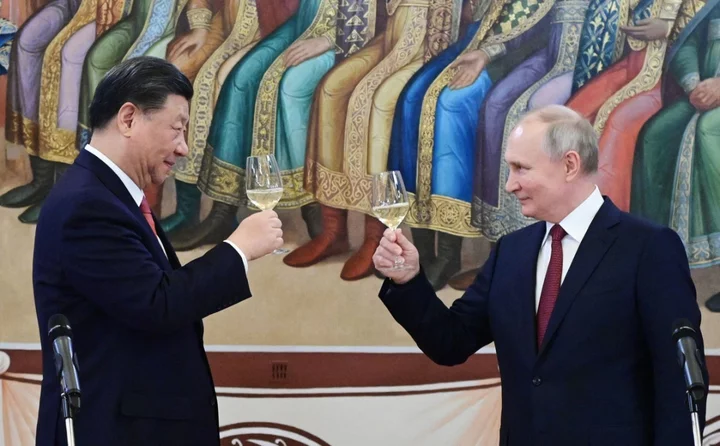
Putin trip to meet Xi in China confirmed for next month
Vladimir Putin has accepted an invite from Xi Jinping to visit China for a Belt and Road Summit being held in October in his first known trip abroad since an arrest warrant was slapped against him for the deportation of children from Ukraine. The Russian president recently met North Korean dictator Kim Jong-un and is looking to cement ties with a handful of allies after being isolated on the world stage due to his invasion of Ukraine. Russia and China are “integrating our ideas of creating a large Eurasian space”, Mr Putin said, adding that the Chinese-led Belt and Road initiative is a part of that. He announced his intention to visit Beijing after a meeting with Chinese foreign minister Wang Yi, who is in Moscow this week for a strategic diplomatic visit. Mr Putin told the top Chinese diplomat that the Belt and Road strategy “fully meets and coincides” with Russia’s interests, according to a statement by the Kremlin. He will be attending the summit in Chinese capital Beijing. “We believe in merging our vision of creating a Greater Eurasian space with the idea of our Chinese friends as part of the Belt and Road Initiative, and we have been quite good at synchronising our efforts,” he said. After invading Ukraine in February last year, Mr Putin has increasingly relied on seeking support from his allies in Asia, prominently China and North Korea. Russia has also amped up trade with China by selling it more energy and showing diplomatic bonhomie by carrying out joint military exercises. The talks in Beijing will be thorough, said Nikolai Patrushev, a close aide to the Russian president and the secretary of Russia’s Security Council. He said Russia and China should deepen cooperation in the face of the West’s attempt to contain them both. Both countries also have strained relations with the US, with Mr Xi briefly becoming the only foreign leader to have paid Mr Putin a visit in Moscow until recently, when Mr Kim revelled in his own six-day sojourn to Russia’s far east. A flagship initiative of Beijing, the Belt and Road project has been a key prospect for China to expand its influence in developing countries through infrastructure projects. On the continuing war in Ukraine, China has shown a neutral stand and has gone to the extent of criticising Western sanctions against Moscow and the arming of Kyiv by several Western nations. It also accused Nato and the US of provoking Russia’s military action and declared last year that it had a “no-limits” friendship with Russia. Earlier this year, CIA director William Burns said Russia was becoming more and more dependent on China and was even at risk of becoming its “economic colony” in time. Read More Why Vladimir Putin needs Xi Jinping now more than ever Why Vladimir Putin and Kim Jong-un are desperate for each other’s help Ukraine kills 130 Russian soldiers in single day in southern push Chinese foreign minister visits Russia for ‘security’ talks day after Kim Jong-un leaves country
2023-09-21 19:20
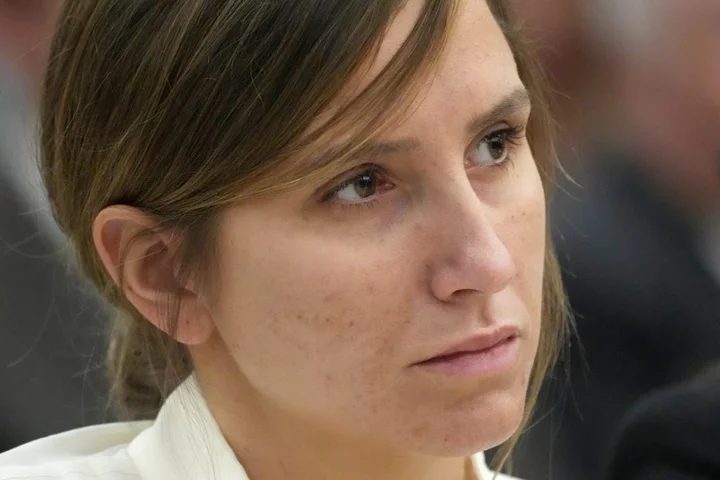
Grief author accused of killing husband with fentanyl cocktail claims damning letter is merely a book excerpt
A grief author accused of poisoning her husband with a fentanyl-laced cocktail has claimed a damning letter found in her jail cell is merely an excerpt from her new book. Kouri Richins, 33, is facing charges of aggravated murder and three counts of drug possession with intent to distribute over the March 2022 death of her husband Eric Richins. Ms Richins allegedly killed her husband of seven years and father of her children by slipping a lethal dose of fentanyl into a Moscow Mule he later drank. Before her arrest earlier this year, Ms Richins self-published a children’s book about grief based on her children’s experiences after they lost their father. Last week, the 33-year-old was charged with witness tampering after a letter was found in her cell in which she allegedly asked her brother to “falsely” testify that her husband died after ordering drugs and pills from Mexico. But now, in a phone call to her mother, Ms Richins has claimed the incriminating letter was simply part of a fictional book she is writing about her stay in a Mexican prison, according to court documents. “When I first got in here I was telling you how I was writing a book … those papers were not a letter to you guys, they were part of my freaking book … I was writing this fictional mystery book,” Ms Richins says in the call, according to a court filing. “I go to Mexico and I’m like trying to find these drugs … I’m writing about Dad … like me and Dad went to Mexico to find these drugs … you can very much tell that the whole thing is very much a story … then I get in the Mexican prison … I said have Skye sneak me in some white strips because my teeth are getting yellow because all we do is drink coffee in the Mexican prison.” In the jailhouse letter, Ms Richins told her mother to instruct her brother, Ronald Darden, to testify that her husband got fentanyl from Mexico. “Here is what I’m thinking but you have to talk to Ronney,” Ms Richins wrote in the letter. “A year prior to Eric’s death, Ronny was over watching football and Eric and Ronny were chatting about Mexico trips. Eric told Ronny he gets painkillers [and] fentanyl from Mexico.” Ms Richins went on to write that Mr Darden “would probably have to testify to this but it’s super short not a lot to it”. She also said in the letter Mr Darden could take some liberties with the narrative as long as he got the point across. Prosecutors have previously said there is no evidence suggesting Mr Richins bought the fentanyl that killed him. In a request to the court filed on Tuesday, prosecutors said Ms Richins’ motion about the letter “contains factual errors and legal misunderstandings, rendering it unpersuasive at best”. Prosecutors have claimed that Ms Richins had previously tried to poison her husband after he consulted a divorce attorney on learning that his wife was $2m in debt. Ms Richins had also reportedly taken out at least four life insurance policies on her husband before allegedly poisoning him. Ms Richins has denied all the allegations against her. If convicted, she faces between 25 years to life in prison. Read More Grief author accused of killing husband with fentanyl allegedly asked brother to lie in letter found in cell Mother accused of killing husband with fentanyl-laced cocktail ‘misses her children’ in prison, lawyer says Utah woman who allegedly sold author Kouri Richins fentanyl used to poison husband appears in court
2023-09-21 17:55
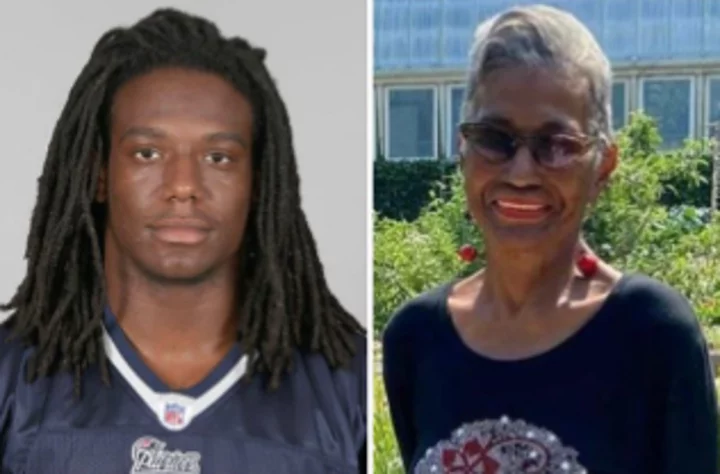
Sergio Brown missing - updates: Ex-NFL player tracked to Mexico after new Instagram video
Authorities in Illinois reportedly believe former NFL player Sergio Brown could be in Mexico, days after his mother was found dead in a creek behind her home. Mystery erupted around Mr Brown on Saturday after a concerned family member filed a missing persons report for the 35-year-old New England Patriots alum and his mother Myrtle Brown, 73. Myrtle was found dead less than 100 yards from her Maywood home the following day. Her death was ruled a homicide as the Cook County Medical Examiner’s Office found injuries resulting from an assault. The case took a bizarre turn as videos emerged from an Instagram account linked to Mr Brown. Authorities had said they were investigating the authenticity of the posts, in which a man identified as Mr Brown claimed he was kidnapped by the FBI and that his mother was on vacation. Maywood police has now determined that one of the videos was recorded in Playa del Carmen, Forbes reports. The Independent has not received confirmation from authorities that Mr Brown is in Mexico. Eagle-eyed social media users previously pointed out that a building’s logo in the background of the video appeared to spell the words “Sabbia Condos.” Read More Missing ex-NFL star posts bizarre Instagram about police and FBI after mother found dead in creek Ex-NFL star Sergio Brown and his mother went missing. Police say she was murdered and he has yet to be found Sergio Brown posts second strange video about Finding Nemo while ‘missing’ after mother’s death
2023-09-21 17:26
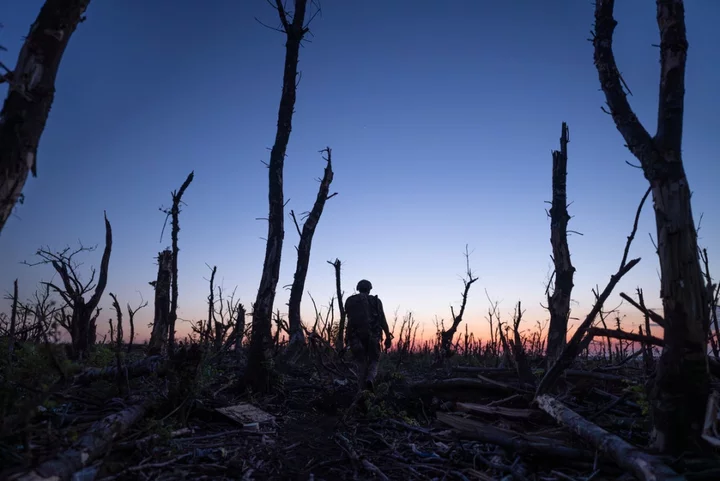
Inside Ukrainian brigade’s battle ‘through hell’ to reclaim village from Putin’s troops on way to Bakhmut
The Russian bullet struck the sergeant just above the left ear. The leader of the Ukrainian platoon was down. Headquarters radioed a battlefield promotion to the private who had called him “brother” — a man known as Courier. Courier knew the platoon's orders were to move forward through the forest, on the road to Bakhmut. He hesitated for 30 seconds near his mortally wounded commander. Maybe a minute. Then he decided: there would be no turning back as he howled “forward”. He fired toward a trench just ahead until he was sure the Russians inside would never shoot again. Then the men stumbled through the charred spindles of trees toward the village of Andriivka — the objective of the 3rd Assault Brigade since the start of Ukraine’s counteroffensive this summer, about 6 miles (10 kilometers) south of the city of Bakhmut. The sergeant, Gagarin, and other injured soldiers could only be evacuated after dark, because the Russians were also hunting downed Ukrainians. Days later, as he prepared for Gagarin's funeral, Courier predicted his own future, his pale eyes unfocused. “This forest is taking our friends away, and this is the worst,” he said. “And when I think about how far we still need to move forward ... most likely someday I will be the one to remain lying in the forest, and my friends will just go forward.” This stretch of dead forest — a couple dozen trees wide and a mile (2 kilometers) long — toward the equally dead village of Andriivka is one of countless like it on the road to Russian-controlled Bakhmut, which has now taken on huge symbolic significance in the Ukrainian counteroffensive. The Associated Press spent two weeks with the brigade for an intimate glimpse into the speed, direction and cost of the counteroffensive, through scenes witnessed in the forest and at rest, in helmet camera footage and drone video. A lot rides on their progress. Ukrainian president Volodymyr Zelensky is making his country's case to Washington on Thursday for more money and weapons, and must persuade his audience that the counteroffensive is working. The US Congress is currently weighing president Joe Biden’s request to provide as much as $24bn more in military and humanitarian aid. In an interview with “60 Minutes,” Mr Zelensky acknowledged the counteroffensive was slow, but added: “It is important that we are moving forward every day and liberating territory.” A study earlier this month by the Royal United Service Institute, a London-based think-tank, found that Ukrainian forces are averaging 700-1,200 meters of progress every five days. That gives Russian forces time to dig in and especially to mine territory as they pull back. The 3rd Assault Brigade, composed entirely of volunteers and considered one of Ukraine’s best and most experienced corps, has been fighting almost nonstop in the east since January, while less-experienced units received new training and modern weapons to fight in the south. The AP is identifying the men by their call-signs, which is both how they identify each other and a military requirement to report in-depth on the unit. Bakhmut fell to Russia in May, largely due to waves of attacks from mercenary Wagner fighters, including prison conscripts thought to have died by the hundreds. Ukraine has been trying to reclaim it ever since, hoping to deal a major psychological blow to Russia. But the soldiers sent to carry out the task are relying on largely Soviet-era armoured vehicles and older weapons. In the past month, the 3rd Assault Brigade had only been able to move a mile (2 kilometers), crossing mines and booby-trapped trenches and dodging artillery, drone-launched grenades and Russian forces within shouting distance. The questions now facing them were the same ones facing their country: Would they succeed, and at what cost? Andriivka was their goal, as important as any strip of land in Ukraine. And on 6 September, the day Courier left his commander's body behind, he and his men took over a trash-strewn trench in the middle of the forest and held it for four full days. On either side of them were mined fields that once grew wheat and now sprout only craters. During moments of rest, he leafed through a diary, written longhand by a Russian soldier: “I’ve been at war for four weeks already and I miss my mum,” Courier read. Courier asked one of the Russian prisoners who surrendered what he knew about the diary. The Russian replied: “I don’t know. I just got here today.” Maybe the author was the Russian whose body Courier propped up to protect himself from incoming fire. Or maybe he was one of the Russians who had shot Gagarin and been killed in turn a few minutes later. Courier didn't know. But by then, Gagarin was dead. And the forest kept claiming others. Shepherd, who was wounded in the leg in the morning and had to wait hours for evacuation from the battlefield, was a mask of pain. Chapa too. A grenade struck Spaniard’s helmet, and the resulting head injury would leave him helpless. Gary had no obvious injuries but was so shell-shocked he could barely make it through a conversation. Courier would go to western Ukraine and represent the platoon at Gagarin’s funeral. Gagarin, ironically named for the Russian cosmonaut who was the first human in space, was buried in his hometown of Polonne, a 550-mile (900-kilometer) drive from the battlefield. As military pallbearers walked uphill toward the churchyard, residents along the way stopped and knelt to honour the dead along flower-lined roads. One of the men carrying the casket remarked on the view from the village cemetery. “I’ve done this 56 times,” he said grimly. Social media feeds from the brigade show dozens of funeral announcements since the counteroffensive began. Gagarin’s mother sought out Courier, who was among the last to see her son alive. But he finds it hard to talk to civilians these days. “I feel like there is a gap between civilians and us now," he said. “When the war is over, I will probably just leave to fight elsewhere.” For Courier, war is complicated. He says he enjoys the dopamine rush, when he leaves the “horrible grinder," comes back to headquarters and jumps down from the armored vehicle. “You look at the sky and you look around, and you understand that you’re alive and nothing can kill you,” he said. "This is the moment. This is a feeling you cannot get anywhere else in life.” And yet he did not want to return to the strip of forest leading to Andriivka. His commanders ordered him to take 10 days’ leave, a break for a fighter whose anguish they sensed despite his outward calm. He would take the time to go fishing and clear his head. “Unfortunately, I’m only able to leave after going through hell,” he said bitterly. On the day of the funeral, 13 September, any man whole enough to fight was in the forest, including another sergeant in the platoon, Fedya. On 5 September, Fedya had been lightly wounded by a cluster munition, and the injury may have saved his life. Gagarin took his place in the assault, and that was the day he died. The last push started on 14 September. Men from other depleted units from the 3rd Assault Brigade joined in for the usual three- to four-day stint on the battlefield. After two months of inching their way forward through the stand of ash trees, maybe they would finally break through the woods to Andriivka. “How many more lives do we need to give?" Fedya asked. "How many more forests are there?” Fedya sees war as something to be perfected through a combination of study and experience. A 24-year-old with a smooth and unlined face, he wears his authority lightly, introspective but with little time or energy to spare on self-doubt or guilt. He dreams of war, and when he wakes, it is there waiting for him to move forward. “War is a science, and you have to get better at it and study. If you don’t, you have no chance of survival,” said Fedya. “The smarter you are, the more qualified you are, the better your chances of coming back alive.” On 14 September, they finally did it — more than three months after receiving the order to reclaim Andriivka. They broke through the shelling and the drone-launched grenades, firing at Russian forces who fled in front of them. The day was a blur. The Ukrainians pummeled the tiny village with artillery and then threw a smokescreen into its main street. Russian artillery hit retreating and surrendering Russian soldiers, whose bodies lay face down or curled on their sides. The last hundred meters was a mix of blood, metal, trash, spent cartridges and shredded armour. The Ukrainians went house to house, taking Russian prisoners and killing those who fought back. Even after the last of the Russian forces were expelled, Andriivka came under constant shelling, with buzzing drones on both sides. Fedya warned his men to shoot down the ones that hovered: They were the ones that dropped grenades. That night, Fedya dreamed he was cowering behind a shrapnel-pierced truck on the battlefield and was hit by artillery fire. The next morning, Fedya carried a Ukrainian flag to hoist in the reclaimed village of Andriivka. It was time to retrieve the bodies. There was the body of 19-year-old Riley, killed on the first day he ever fought. There was Zima. There were others, placed carefully into bags and carried back through the forest. The men left dozens of Russian bodies for later. Andriivka was now nothing but a pile of bricks and scorched trees with the smell of death. But it was in Ukrainian hands, and Fedya was ready to hand control to the next brigade to reclaim the next forest. He huddled in one of the few basements left and tried to explain to the incoming commander why the fight for this broken town was worth it. “Look at these fields, this forest. Everything grows again," he said. "The cities that we reclaim, they will be rebuilt. ... We will clear out all that’s left of the Soviet Union. ... The war could be the best thing to happen, in the sense that everything can start fresh.” Ukrainian officials said this month’s battle’s for the road to Bakhmut may have taken as many as three Russian brigades out of combat, as cited in an assessment Tuesday by the Institute for the Study of War. But Fedya was ready to leave. “I’m tired of this forest. I want to go home. I want to wash and sleep,” he said with a curse. “Until morning. And in the morning, I’ll come back.” Hinnant reported from Paris. Alex Babenko contributed to this story. Read More Ukraine war’s heaviest fight rages in east - follow live Charity boss speaks out over ‘traumatic’ encounter with royal aide 3 South Africa navy personnel die after they are swept off a submarine deck during supply operation Kenya's president is committing his country to lead a multinational force to Haiti to combat gangs Singapore police uncover more gold bars, watches and other assets from money laundering scheme
2023-09-21 16:59
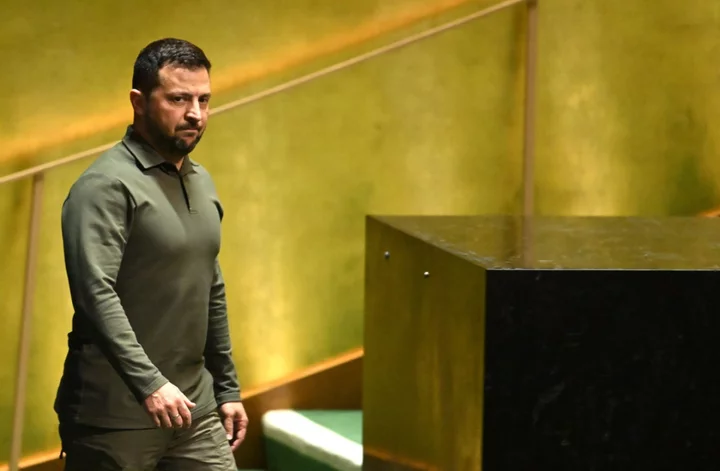
Russian official tries to disrupt Zelensky’s speech at UN and gets told to ‘stop the war’
The Russian envoy attending the United Nations Security Council meeting on president Vladimir Putin’s behalf was told to “stop the war” after he objected to Ukrainian president Volodymyr Zelensky’s speech on Wednesday. Russia’s ambassador to the UN Vassily Nebenzia protested the council president’s decision to allow Mr Zelensky to speak before the 15 council members. “We would like to ask you on what basis you are proposing to allow president Zelensky to speak before the members of the council, many of whom are represented by the heads of states and governments,” the Russian envoy said, accusing the Albanian state of demonstrating “open disregard for the procedures and practices of the UN security council”. Albanian prime minister Edi Rama shot back at the Russian leader: “I must say that coming from you all this lecture of violating the rules in this building is quite an impressive shot.” “You stop the war and president Zelensky will not take the floor,” he said, after noting the objection flagged by the Russian leader over the Ukrainian leader speaking before the council members had addressed the meeting. Mr Rama also cited the council rule allowing a non-member to speak first and added that “this is not a special operation by the Albanian presidency”, eliciting laughter with a quip about Russia’s insistence on referring to its offensive against Ukraine as a “special military operation”. Another heated exchange erupted at the table after Mr Nebenzia referred to Mr Rama as Albania’s prime minister and a Nato member instead of as the council president but Mr Rama declared: “I take note, and we’ll continue with our session.” Shortly after, Mr Zelensky took to X and thanked the Albanian leader for “correctly handling Russia” as he shared a video clip of the heated exchange. “Dear @EdiRamaal, today at the UNSC you showed the world how to correctly handle Russia, its lies, and its hypocrisy. I thank you for steering the presidency in such a principled manner,” he said on Twitter. The second day of the UN meeting in New York was flooded with speculations on the Ukrainian president and Russia’s top diplomat Sergei Lavrov clashing for the first time in person since the invasion in Ukraine started in February last year. The two were either expected to clash, speak or totally avoid each other. In the end, Mr Zelensky and Sergei Lavrov avoided staring each other down across the UN Security Council’s famous horseshoe-shaped table as the former left before Mr Lavrov arrived. Mr Zelensky denounced Russia as “a terrorist state” while Russian ambassador Vassily Nebenzia sat facing him near the other end of the table’s arc. As the Ukrainian president launched into his remarks, the Russian briefly looked at his phone, then tucked the device away. Mr Zelensky left before Mr Lavrov’s arrival, which happened as US secretary of state Antony Blinken was accusing Russia of having “shredded” key provisions of the UN Charter. Mr Lavrov blamed the West for “a shaking of global stability as well as the exacerbation and the fomenting of new hotbeds of tension”. He said “the US and its satellites have egregiously and openly interfered in the domestic affairs of Ukraine,” heightening the risks of global conflict. He insisted that Russia has “fully” respected the provisions of the UN charter “in an interconnected way”. Read More Ukraine-Russia war – live: Zelensky says UN ‘incapable’ of stopping Putin’s ‘criminal aggression’ Ukraine kills 130 Russian soldiers in single day in southern push Ukraine rejects defective Leopard 1 tanks from Germany after finding ‘serious faults’ Inside a Ukrainian brigade’s battle ‘through hell’ to reclaim a village on the way to Bakhmut Russian strikes cities from east to west Ukraine, starting fires and wounding at least 14
2023-09-21 15:50
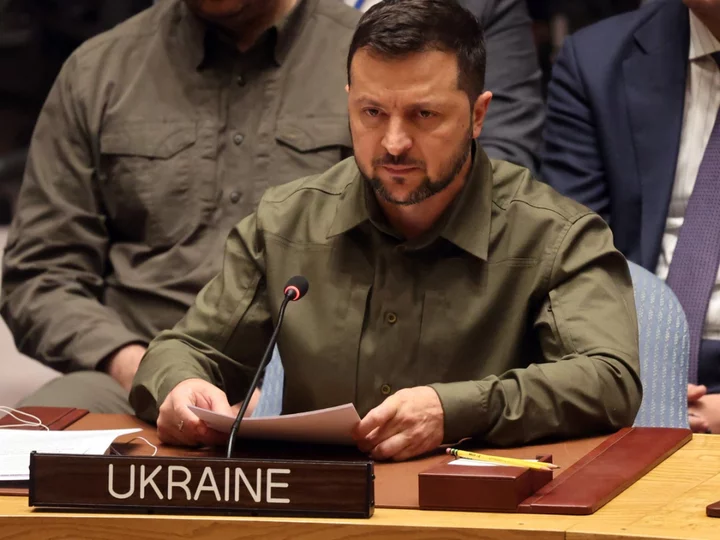
Ukraine-Russia war – live: Poland to stop sending Kyiv weapons as Putin unleashes strikes on six cities
Russia fired deadly missiles across six cities in Ukraine this morning with two reported dead, fatalities are expected to rise as dozens are trapped under rubble. The strikes coincided with the International Day of Peace and United Nations General Assembly summit in New York where President Volodymyr Zelensky delivered a speech and presented a ‘peace formula’ Putin’s troops targeted the southern city of Kherson, Kyiv, the Slobidkysi district of Kharkiv, Cherkasy in central Ukraine, an industrial zone in the region of Lviv and the northwest city of Rivne. Moscow targeted commercial and residential buildings, injuring atleast 21, as well as a nine-year-old girl. Blazing fires are causing further damage The attack comes as Poland said they will stop providing Ukraine with further weapons in their military efforts against Russia. Polish Prime Minister Mateusz Morawiecki said the decision was not related to a temporary ban on Ukrainian grain imports despite the escalation of diplomatic disputes. Morawiecki said: “We are no longer transferring any weapons to Ukraine because now we will arm ourselves with the most modern weapons,” he said in an interview on the private TV broadcaster Polsat News late Wednesday. Read More Ukraine rejects defective Leopard 1 tanks from Germany after finding ‘serious faults’ Zelensky tells UN to not make deals with ‘evil’ Russia: ‘Ask Prigozhin whether Putin can be trusted’ How Ukraine’s battle for the Black Sea is inflicting serious pain on Putin’s forces
2023-09-21 14:51

Poland to stop supplying weapons to Ukraine over grain row
It comes as tensions rapidly escalate between the two countries - historically close allies.
2023-09-21 13:28
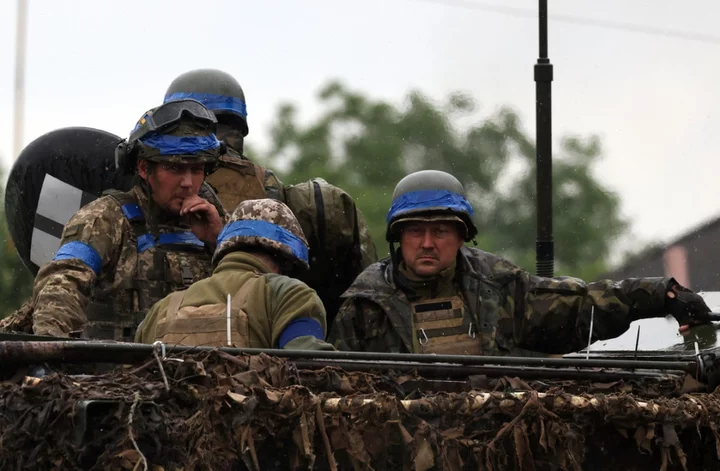
Ukraine kills 130 Russian soldiers in single day in southern push
More than 300 of Vladimir Putin’s soldiers have been killed and wounded in a span of 24 hours in Zaporizhzhia’s oblast, Ukraine’s armed forces said in a battlefield update on Wednesday. Ukrainian commander general Oleksandr Tarnavskyi said the Russian forces attacked Ukrainian positions 18 times with 830 attacks, one rocket and 23 air strikes in the past day. In retaliation, the artillery units under him launched 1,232 fire missions during the day. The fierce fighting update came from Tavriia village in Zaporizhzhia oblast where Russian forces and Ukrainian troops have been engaged in a grinding battle since the invasion began in February last year. “Over the last day, the enemy lost 325 people – 130 irretrievably injured, 194 wounded, 1 captured,” the commander of the Tavriia operational and strategic group of forces said on his official Telegram channel. The top military official of the unit said his unit destroyed 48 pieces of Russian military equipment. “Among them are three tanks, eight armoured combat vehicles, seven artillery systems and mortars, one multiple-launch rocket system, 14 UAVs, and 15 pieces of vehicles,” he said. One ammunition depot and another strategic object belonging to the Russians was also destroyed, the commander said. On Wednesday, the Ukrainian general staff said the country’s forces continued their offensive operations and inflicted significant losses on Russia’s manpower and equipment in the Melitopol direction but did not state a tally of casualties and losses mounted. Experts monitoring the war have said Russia’s losses in the western Zaporizhzia oblast have significantly shot up. This is heightened by the Russian military’s likely struggles with a “lack of available combat-effective units that the Russian command is willing to laterally redeploy to this sector of the front”, the US-based Institute for the Study of War said. The loss of Russian troops recorded on Tuesday is “significantly higher than Russian losses during the previous two days when Russian forces lost roughly 200 personnel each day”, according to the Tavriisk Group of Forces spokesperson, colonel Oleksandr Shtupun. Russia deployed its elite airborne unit (VDV) forces in Zaporizhzhia, a strategic territory in the war housing Europe’s biggest nuclear power plant. But the spokesperson added that Russia is sending convict recruits named “Storm-Z” detachments which will act as “cover” for the elite troops, “possibly referring to the need to cover the VDV units during a potential withdrawal”, the US-based think-tank said. Read More Russian strikes cities from east to west Ukraine, starting fires and wounding at least 14 Ukraine rejects defective Leopard 1 tanks from Germany after finding ‘serious faults’ How Ukraine’s battle for the Black Sea is inflicting serious pain on Putin’s forces Ukraine-Russia war – live: Zelensky says UN ‘incapable’ of stopping Putin’s ‘criminal aggression’
2023-09-21 13:19
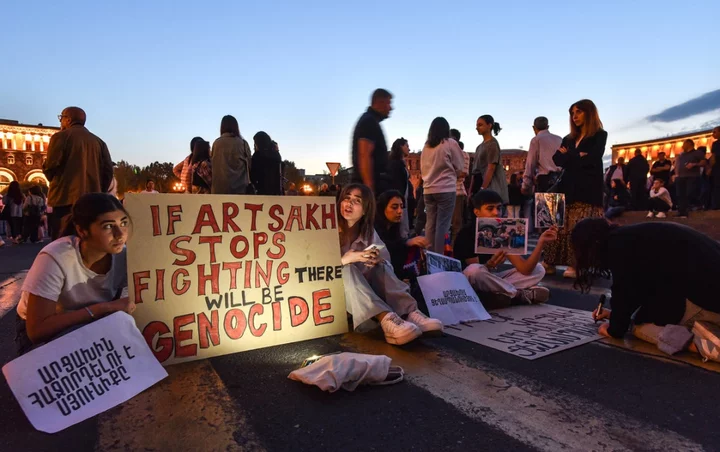
Azerbaijan hails end of Armenian separatists’ advance in Nagorno-Karabakh
Azerbaijan's president on Wednesday hailed the country's restoration to "full sovereignty" over the breakaway Nagorno-Karabakh region as ethnic Armenian forces agreed to lay down their weapons. Authorities in the Armenian region declared that the local defence force will disarm and withdraw all weaponry under a Russia-mediated ceasefire following the latest bout of fighting in the decades-long separatist conflict. President Ilham Aliyev in a televised address hailed his soldiers, while offering the ethnic Armenians of the Nagorno-Karabakh region prospects of cooperation, reconciliation and joint development. "In just one day, Azerbaijan fulfilled all the tasks set as part of local anti-terrorist measures" and "restored its sovereignty", the president said, adding he now wished to integrate Karabakh's population and turn the region into "paradise". He said Azerbaijan had nothing against Karabakh's Armenian people – "they are our citizens" – but only against their "criminal" separatist leadership. His words appeared aimed at addressing allegations by Armenian leaders that Baku planned to "ethnically cleanse" Karabakh's 120,000-strong Armenian population amid decades of mistrust between the two nations. The Azerbaijan army on Tuesday launched an "anti-terrorist" operation, unleashing an artillery barrage and drone attacks against outnumbered and undersupplied pro-Armenian forces. Nagorno-Karabakh human rights ombudsman Gegham Stepanyan said at least 200 people, including 10 civilians, were killed and more than 400 others were wounded in the fighting. He said earlier that children were among the dead and wounded. Russia and America condemned the “bloodshed” and called for an “immediate” end to hostilities between Azerbaijan and Armenians in the contested region. French president Emmanuel Macron spoke with Mr Aliyev and "condemned Azerbaijan's decision to use force ... at the risk of worsening the humanitarian crisis" and "compromising ongoing efforts to achieve a fair and lasting peace", his office said. Russian peacekeepers in a statement on Thursday said they have taken in about 5,000 Karabakh residents after evacuating them from dangerous areas. Thousands of Armenians also gathered at the airport of the regional capital, Stepanakert, in a bid to flee the conflict. Armenian prime minister Nikol Pashinyan in an address to the nation said the fighting decreased following the truce, emphasizing that Russian peacekeepers in Nagorno-Karabakh are fully responsible for its residents’ security. "If peacekeepers have proposed a peace deal, it means that they completely and without any reservations accepted the responsibility of ensuring the security of Nagorno-Karabakh Armenians, and provide the conditions and the rights for them to live on their land and in their homes safely," he said, according to the Associated Press. Mr Pashinyan, who has previously recognised Azerbaijan's sovereignty over Nagorno-Karabakh, said Armenia wouldn't be drawn into the fighting. He said his government didn't take part in negotiating the deal, but "has taken note" of the decision made by the region's separatist authorities. Protesters rallied in the Armenian capital of Yerevan for a second straight day Wednesday, blocking streets and demanding that authorities defend Armenians in Karabakh. Azerbaijan's move to reclaim control over Nagorno-Karabakh raised concerns that a full-scale war in the region could resume between the two nations, which have been locked in a struggle over Nagorno-Karabakh since a separatist war there ended in 1994. During another war that lasted for six weeks in 2020, Azerbaijan reclaimed broad swaths of Nagorno-Karabakh and adjacent territories that were held for decades by Armenian forces. More than 6,700 people died in the fighting, which ended with a Russian-brokered peace agreement. Moscow deployed about 2,000 peacekeeping troops to the region. Read More Ceasefire agreed after Azerbaijan unleashes military strikes in Nagorno-Karabakh Why new fighting in Azerbaijan's troubled region may herald a new war Nagorno-Karabakh: Fears of full-scale war as Azerbaijan launches attack on Armenian positions The Body in the Woods | An Independent TV Original Documentary The harrowing discovery at centre of The Independent’s new documentary
2023-09-21 13:18
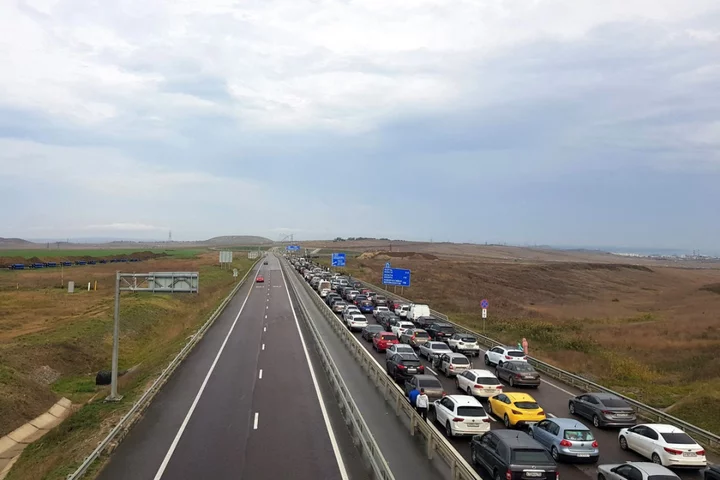
Ukraine launches its ‘largest drone strike’ of war so far on Crimea and Black Sea targets
Ukraine has fired at least 19 “lethal” drones over the Black Sea and the Crimean peninsula, and three more over other bordering regions of Russia, the Russian defence ministry said on Thursday. The Russian anti-aircraft units intercepted and destroyed over a dozen drones in the region, the ministry said on its Telegram channel. “In the night from 20 to 21 September, an attempt by the Kyiv regime to commit a terrorist attack with lethal drones on sites in the Russian Federation was intercepted,” the ministry said. Russian and Crimea-related Telegram channels reported loud explosions overnight. “In Sevastopol, in the area of ​​​​Kazachya and Kamyshovaya bays, it has been very loud for the last hour,” read a post on Telegram channel Crimean Wind, adding that the explosions set off car alarms. “The Ukrainian Armed Forces are massively trying to attack Crimea using drones. According to military officials, at least seven drones have been shot down in just the last 20 minutes. Residents of Evpatoria, Dzhankoy, Balaklava, Sevastopol, Saki, Novofedorovka and other cities report the sounds of air defence,” said Baza, a prominent Telegram account related to Russia’s security services. It added that the locals have termed the overnight attack as the “largest” drone strike of all time. Three drones were downed over Kursk, Belgorod and Orlov in central and southern Russia. Belgorod, just 40km (25 miles) from Ukraine’s war frontline, has been under continued air assault every day this month. The illegally annexed Crimea is also now heavily targeted in the continuing warfare, with sensitive military infrastructure and sites in the region on Kyiv’s radar. The ministry did not mention if there are any immediate casualties or damage. While Ukraine rarely takes responsibility for these attacks on Russia and Russian-controlled territories, it has recounted the strikes with a sense of achievement as it maintains that targeting these regions aids its military counteroffensive. On Wednesday, Ukraine’s defence ministry made a rare triumphant video and confirmed its forces struck a Russian Black Sea fleet command post near Sevastopol in Crimea, a week after the major naval port was set ablaze in a cruise missile attack. Read More Ukraine-Russia war – live: Zelensky says UN ‘incapable’ of stopping Putin’s ‘criminal aggression’ Two-thirds say nuclear weapons make UK safer as support rises to Cold War levels South Korean leader warns Russia against weapons collaboration with the North UN incapable of stopping aggressors like Putin invading other countries, says Zelensky Zelensky tells UN to not make deals with ‘evil’ Russia: ‘Ask Prigozhin whether Putin can be trusted’
2023-09-21 12:28
You Might Like...
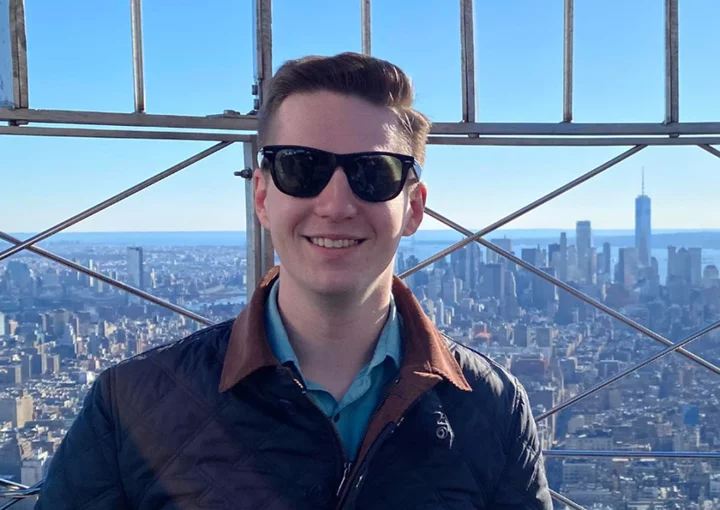
Body of Goldman Sachs banker pulled from NYC creek after he vanished from concert
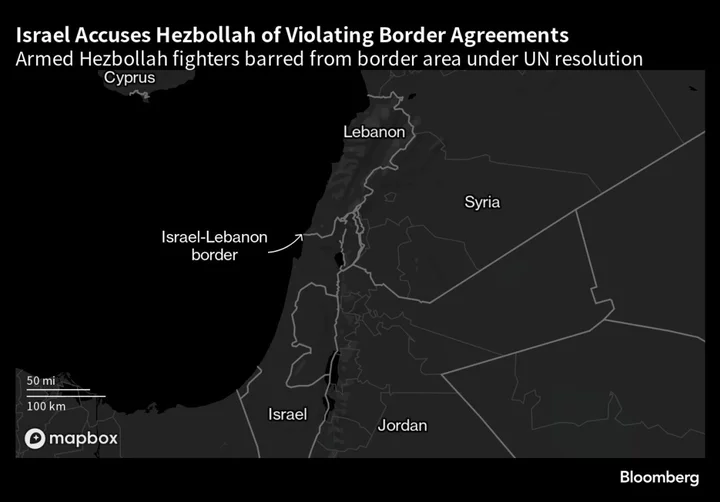
Israel Says Iran-Backed Militia Is Setting Up Illegal Outposts
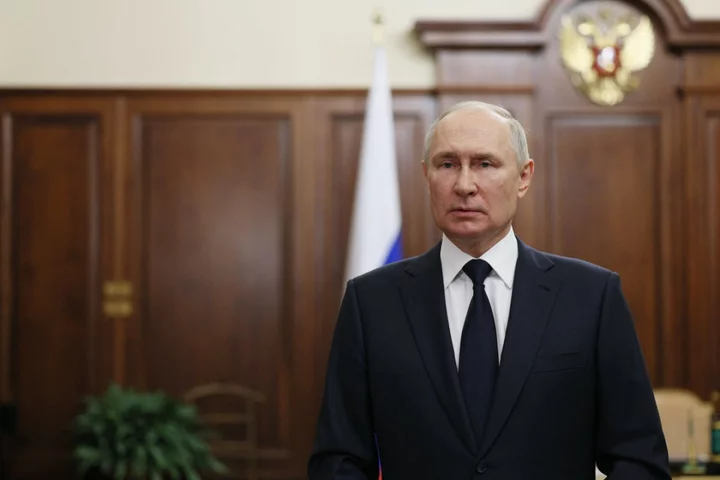
Putin claims Russia is united than ever just days after Wagner troops march on Moscow
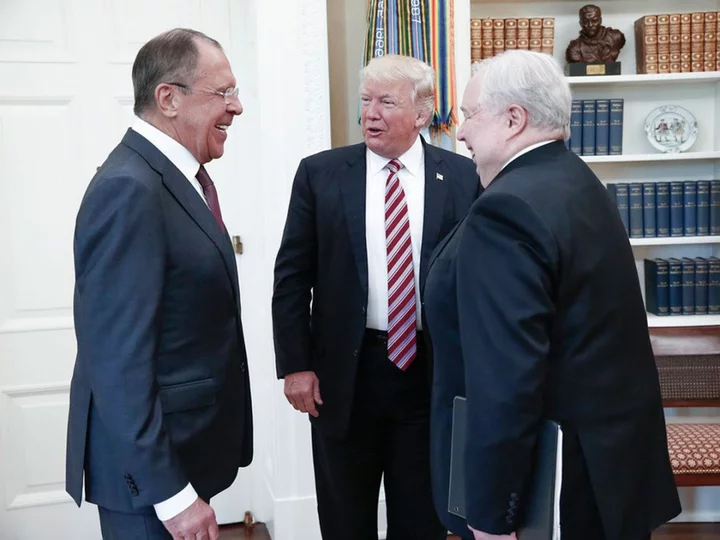
Former US general reminds GOP attacking Biden of time Trump leaked Israeli intel to Iran ally
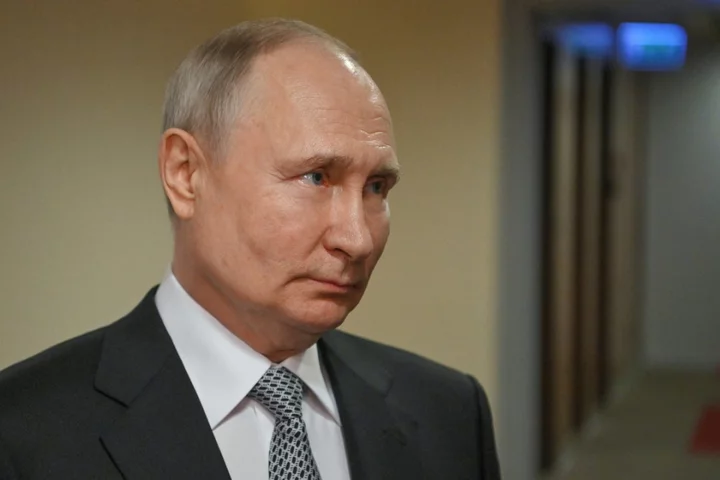
Putin says Russian mercenary group has no legal basis so 'doesn't exist'
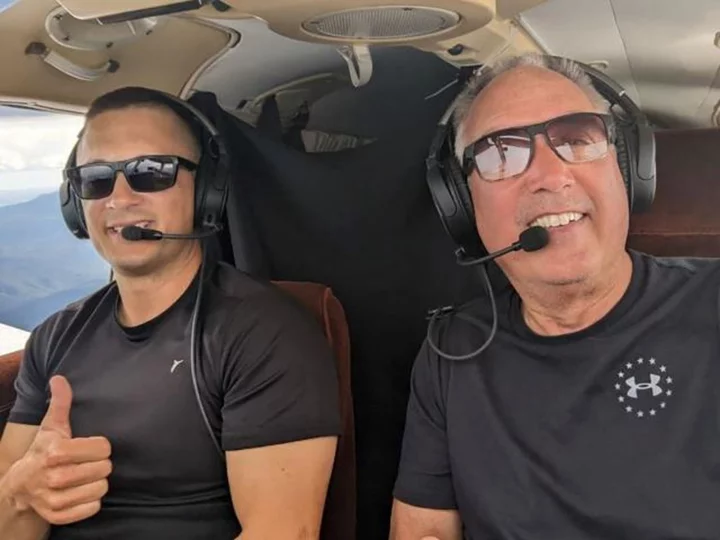
2 pilots say they visited 48 US states in less than 48 hours, potentially breaking a world record
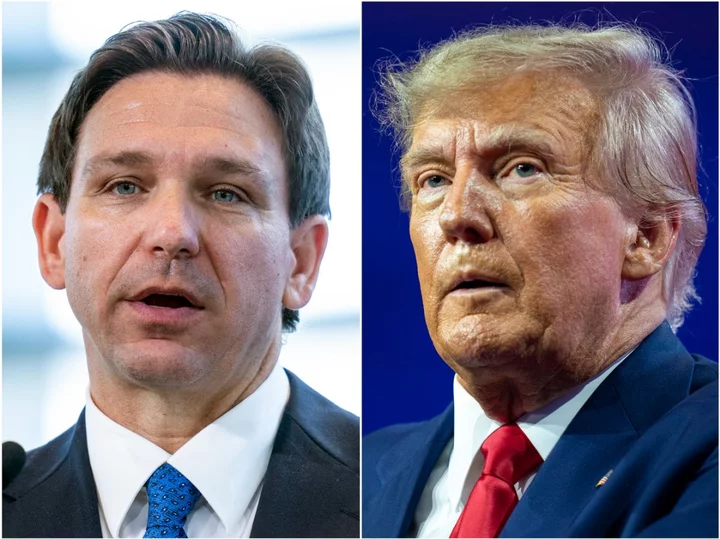
Trump accuses Ron DeSantis of ‘blatantly’ plagiarising his speech
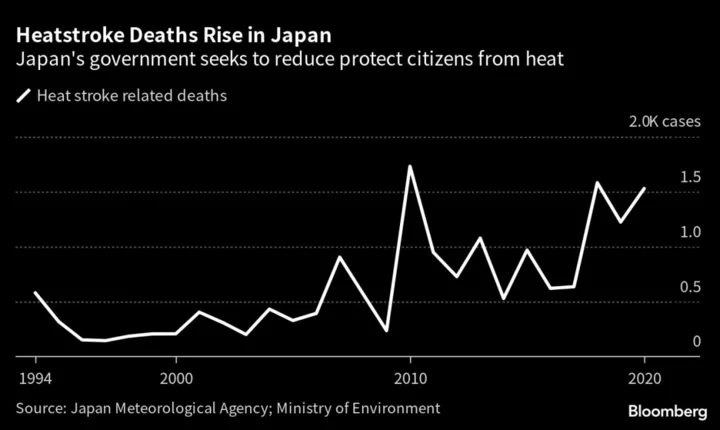
Deaths From Heatstroke Rise in Japan, Prompting Countermeasures
